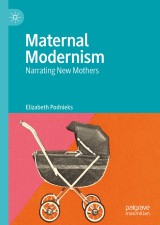Details

Maternal Modernism
Narrating New Mothers|
128,39 € |
|
| Verlag: | Palgrave Macmillan |
| Format: | |
| Veröffentl.: | 01.12.2022 |
| ISBN/EAN: | 9783031089114 |
| Sprache: | englisch |
Dieses eBook enthält ein Wasserzeichen.
Beschreibungen
<p>Drawing on the figure and discourses of the Victorian <i>fin-de-siècle</i> New Woman, this book examines women writers who struggled with conservative, patriarchal ideologies of motherhood in novels, periodicals and life writings of the long modernist period. It shows how these writers challenged, resisted, adapted and negotiated traditional ideas with their own versions of new motherhood, with needs for identities and experiences beyond maternity. Tracing the period from the end of the nineteenth century through the twentieth, this study explores how some of the numerous elements and forces we identify with modernism are manifested in equally diverse and often competing representations of mothers, mothering and motherhood. It investigates how historical personages and fictional protagonists used and were constructed within textual spaces where they engaged critically with the maternal as institution, identity and practice, from perspectives informed by gender, sexuality, nationhood, race and class. The matrifocal literatures examined in this book exemplify how feminist motherhoods feature as a prominent thematic of the long modernist era and how rebellious New Woman mothers provocatively wrote maternity into text and history.</p>
Chapter 1: The “persistent rebels” of Maternal Modernism<div>Chapter: The New Woman, New Modernisms, and New Motherhoods</div><div>Chapter 3: Mothers in New Woman Fiction: “the <i>terra incognita</i> of herself”</div><div>Chapter 4: “The ‘momentousness’ of motherhood”: Maternal Ideologies, Discourses, and Debates in<i> The Freewoman: A Weekly Feminist Review</i> and<i> The Freewoman: A Weekly Humanist Review</i></div><div>Chapter 5: “The Title Role of ‘Mother’”<b>: </b>Silent-Film Stardom and Celebrity Maternity in <i>Photoplay</i> Magazine</div><div>Chapter 6: “Freedom and childbearing”: Prams, Politics, and Literary Life in NewWoman Autobiographies of the Interwar Era</div><div>Chapter 7: “A mother, a wife, a worker and a wonder-woman”: Matroethnography, Black Feminism, and Postcolonial New Womanhood in Buchi Emecheta’s London Narratives</div><div>Chapter 8: Coda:<b> </b>New Womanism in the Twenty-First Century<br></div>
Elizabeth Podnieks is Professor of English at Toronto Metropolitan University, Canada. Her publications include, among others, <i>Daily Modernism: The Literary Diaries of Virginia Woolf, Antonia White, Elizabeth Smart and Anaïs Nin</i>; the critical edition <i>Rough Draft: The Modernist Diaries of Emily Holmes Coleman</i>; and the edited collection <i>Mediating Moms: Mothers in Popular Culture</i>.<br>
<div><p>“Operating within the frame of the “New Modernist Studies,” Podnieks considers the challenges and alternatives women writers and performers make to social conventions relating to motherhood. She engages with scholarship in modernist, feminist and maternal areas, is highly qualified to do so, and advances these fields. The narratives she studies come from a refreshing variety of sources, including New Woman narratives, the journal <i>The Freewoman</i>, the film magazine, <i>Photoplay,</i> and autobiographies, usefully juxtaposing the more recent London narratives of Buchi Emecheta and extending her thinking into the 21<sup>st</sup> century<i>.</i>”</p><p>– <b>Bonnie Kime Scott</b>, Professor Emerita of Women’s Studies, San Diego State University, USA</p></div>Drawing on the figure and discourses of the Victorian <i>fin-de-siècle</i> New Woman, this book examines women writers who struggled with conservative, patriarchal ideologies of motherhood in novels, periodicals and life writings of the long modernist period. It shows how these writers challenged, resisted, adapted and negotiated traditional ideas with their own versions of new motherhood, with needs for identities and experiences beyond maternity. Tracing the period from the end of the nineteenth century through the twentieth, this study explores how some of the numerous elements and forces we identify with modernism are manifested in equally diverse and often competing representations of mothers, mothering and motherhood. It investigates how historical personages and fictional protagonists used and were constructed within textual spaces where they engaged critically with the maternal as institution, identity and practice, from perspectives informed by gender, sexuality, nationhood, race and class. The matrifocal literatures examined in this book exemplify how feminist motherhoods feature as a prominent thematic of the long modernist era and how rebellious New Woman mothers provocatively wrote maternity into text and history.<p></p><p><b>Elizabeth Podnieks</b> is Professor of English at Toronto Metropolitan University, Canada. Her publications include, among others, <i>Daily Modernism: The Literary Diaries of Virginia Woolf, Antonia White, Elizabeth Smart and Anaïs Nin</i>; the critical edition <i>Rough Draft: The Modernist Diaries of Emily Holmes Coleman</i>; and the edited collection <i>Mediating Moms: Mothers in Popular Culture</i>.</p>
<p>First book to examine the intersections of the New Woman, motherhood, and modernism</p><p>Covers textual representations of New Motherhood from the late nineteenth century through the twentieth</p><p>Explores a diverse range of genres, including novels, periodicals, autobiographies and celebrity profiles</p>
<p>“Operating within the frame of the “New Modernist Studies,” Podnieks considers the challenges and alternatives women writers and performers make to social conventions relating to motherhood. She engages with scholarship in modernist, feminist and maternal areas, is highly qualified to do so, and advances these fields. The narratives she studies come from a refreshing variety of sources, including New Woman narratives, the journal <i>The Freewoman</i>, the film magazine, <i>Photoplay,</i> and autobiographies, usefully juxtaposing the more recent London narratives of Buchi Emecheta and extending her thinking into the 21<sup>st</sup> century<i>.</i>” (Bonnie Kime Scott, Professor Emerita of Women’s Studies, San Diego State University, USA)</p>

















